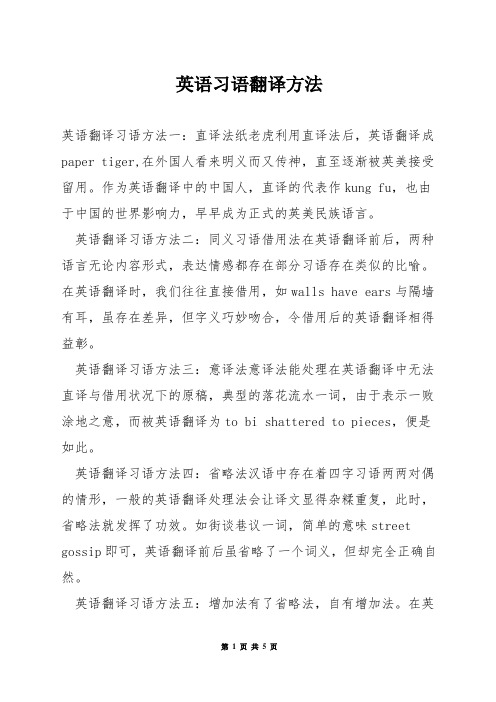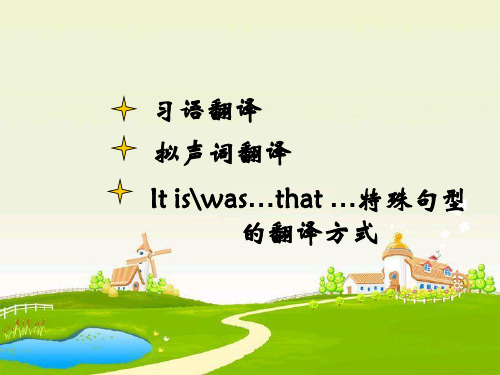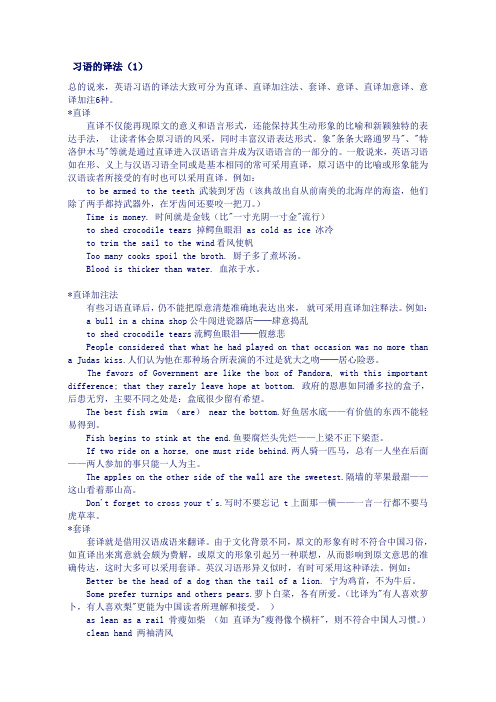英语习语的译法
- 格式:doc
- 大小:26.50 KB
- 文档页数:8

英语习语翻译方法英语翻译习语方法一:直译法纸老虎利用直译法后,英语翻译成paper tiger,在外国人看来明义而又传神,直至逐渐被英美接受留用。
作为英语翻译中的中国人,直译的代表作kung fu,也由于中国的世界影响力,早早成为正式的英美民族语言。
英语翻译习语方法二:同义习语借用法在英语翻译前后,两种语言无论内容形式,表达情感都存在部分习语存在类似的比喻。
在英语翻译时,我们往往直接借用,如walls have ears与隔墙有耳,虽存在差异,但字义巧妙吻合,令借用后的英语翻译相得益彰。
英语翻译习语方法三:意译法意译法能处理在英语翻译中无法直译与借用状况下的原稿,典型的落花流水一词,由于表示一败涂地之意,而被英语翻译为to bi shattered to pieces,便是如此。
英语翻译习语方法四:省略法汉语中存在着四字习语两两对偶的情形,一般的英语翻译处理法会让译文显得杂糅重复,此时,省略法就发挥了功效。
如街谈巷议一词,简单的意味street gossip即可,英语翻译前后虽省略了一个词义,但却完全正确自然。
英语翻译习语方法五:增加法有了省略法,自有增加法。
在英语翻译中,汉语往往简略后能让国人明义,而英语则必须要增加说明,顺合外国人对英语翻译的习惯。
如树倒猢狲散译为Once the tree falls, the monkeys on it will flee helter-skelter中的helter-skelter便是利用增加法,起到调和英语翻译的作用。
2翻译英文文章技巧拿到一篇英文,首先要略读一下,来确定文章风格。
如果是抒情式的必须要将文章翻译得优美一些。
如果是科技文章,则语言必须要偏向专业和精简风格。
要多读相关材料来熟悉所写的内容。
一篇文章都会有自身的主题,要围绕主题多读一些相关的文章,这样在翻译当中才会使用更加合适的词汇、语句。
要注意英语单词对应的语义。
英语单词在翻译成汉语会有不同的意思。



习语的译法(1)总的说来,英语习语的译法大致可分为直译、直译加注法、套译、意译、直译加意译、意译加注6种。
*直译直译不仅能再现原文的意义和语言形式,还能保持其生动形象的比喻和新颖独特的表达手法,让读者体会原习语的风采,同时丰富汉语表达形式。
象"条条大路通罗马"、"特洛伊木马"等就是通过直译进入汉语语言并成为汉语语言的一部分的。
一般说来,英语习语如在形、义上与汉语习语全同或是基本相同的常可采用直译,原习语中的比喻或形象能为汉语读者所接受的有时也可以采用直译。
例如:to be armed to the teeth 武装到牙齿(该典故出自从前南美的北海岸的海盗,他们除了两手都持武器外,在牙齿间还要咬一把刀。
)Time is money. 时间就是金钱(比"一寸光阴一寸金"流行)to shed crocodile tears 掉鳄鱼眼泪 as cold as ice 冰冷to trim the sail to the wind看风使帆Too many cooks spoil the broth. 厨子多了煮坏汤。
Blood is thicker than water. 血浓于水。
*直译加注法有些习语直译后,仍不能把原意清楚准确地表达出来,就可采用直译加注释法。
例如:a bull in a china shop公牛闯进瓷器店──肆意捣乱to shed crocodile tears流鳄鱼眼泪──假慈悲People considered that what he had played on that occasion was no more than a Judas kiss.人们认为他在那种场合所表演的不过是犹大之吻──居心险恶。
The favors of Government are like the box of Pandora, with this important difference; that they rarely leave hope at bottom. 政府的恩惠如同潘多拉的盒子,后患无穷,主要不同之处是:盒底很少留有希望。


本单元要解决的翻译问题1.习语的翻译方法有哪些?2.习语的起源有?3.直译、意译、套译、释义的比较。
4.跨文化语境演讲中引用的谚语,涉及的翻译方法又是什么?5.本单元需要熟记的经典译例是?1、习语的翻译方法:直译法,套译法,意译法,释义法。
直译法:在译文语言条件许可时,在译文中既保持原文的内容,又保持原文的形式-特别指保持原文的比喻,形象和民族地方色彩等。
例如:Knowledge is power. (知识就是力量。
)Time is money. (时间就是金钱。
)Life is short and time is swift.(人生苦短,岁月易逝。
)The eye is the window of the mind.(眼睛是心灵的窗户。
)套译法:用译文语言里的同义习语去套译原文中的习语。
例如:An idle youth,a needy age.(少壮不努力,老大徒伤悲。
)赔了夫人又折兵。
(Throw good money after bad.)意译法:用译语常用的语言和熟悉的形象来翻译英语谚语其特有的民族文化,因此其表达方式和汉语有着某些差异。
当原文的意思内容与译文的表达形式有矛盾不宜采取直译法处理,或用直译法处理会给读者带来歧义时,就应采用意译法。
例如:When Greek meets Greek, then comes the tug of war. (两雄相遇,必有一争。
)Every bean has it’s black. (凡人各有其短处。
)A new broom sweeps clean. (新官上任三把火。
)释义法:以忠实通顺地表达原习语的思想,内容意义为目的,采用解释说明手法,按语义,修辞或句法的需要,增加一些解释说明的词。
补充完善原习语的意思,以表达原习语在上下文中的涵义。
例如:To meet one’s Waterloo.遭遇滑铁卢(遭到惨败)前怕狼后怕虎。
Fear the wolf in fromt and the tiger behind(hesitate in doing sth.)2、习语的起源From daily experience;From myths,legends and tales;From literary works;From history.3、直译、意译、套译、释义的比较有些英语谚语意在言外,语言含蓄,寓意深刻。
习语的翻译方法语言之间的互相翻译不但有利于各国文化的交流,更有利于语言的发展。
在做翻译工作时最怕碰上习语多的文章。
为了忠于原著,译文心须既保持它的外国风味,又要符合本国文字的要求,而翻译习语却是最难把这两个标准一同达到的。
为了要适当地把外国语言中的习语翻译出来,有经验的翻译工作者一般采取下列几种方法:1.直译法----就是按照文字的字面意思直接翻译过来,例如汉语中的“纸老虎”直译成“paper tiger”,外国人看起来不但深明其义,而且觉得很是传神,所以现已成为正式的英美民族语言。
另外,我们口中的“丢脸”也被直译为“lose face”,“走狗”译成为“running dog”。
由于中国热而大为外国人欢迎的“功夫”音译成“kung fu”等也算是直译法的一种。
2.同义习语借用法——两种语言中有些同义习语无论在内容、形式和色彩上都有相符合,它们不但有相同的意思或隐义,面且有相同的或极相似的形象或比喻。
翻译时如果遇到这种情况不妨直载了当地互相借用。
比方说汉语中有一句习语是“隔墙有耳“,英语中却有”walls have ears”,两句话字、义两合,无懈可击。
我们说“火上加油”,英国人则说”to add fuel to the flame”,两者也完全一样。
3.意译法——有些习语无法直译,也无法找到同义的习语借用,则只好采用意译的方法来对待.例如汉语中的”落花流水”用来表示被打得大败之意,译成英文便是“to be shattered to pieces”。
“乌烟瘴气“形容情形混乱不堪,可用“chaos”来表达。
4.省略法—汉语中有一种情况,就是习语中有的是对偶词组,前后含意重复。
偶到这种情况时可用省略法来处理,以免产生画蛇添足之感。
例如“铜墙铁壁”可译成“wall of bronze”已经足够,实在无须说成“wall of copper and iron”。
“街谈巷议”在意义上也是重复的,所以译成“street gossip”便可以了。
▪习语大都具有鲜明代形象,适宜用来比喻事物,因而往往带有浓厚的民族色彩和地方色彩。
不少习语前后对称,音节优美,韵律协调。
由于习语具有这些特点,翻译时就应当尽量保持这些特点。
译者除了忠实地表达原文习语的意义外,还应尽可能保持原文习语的形象比喻,丰富联想,修辞效果以及其民族,地方特点等。
▪英语习语就其广义而言,包括俗语,谚语,俚语等。
▪习语的英译汉有三种主要方法:直译法,套用法,意译法,直译加注法▪一,直译法▪To fight to the last man▪To break the record▪Under one’s nose▪Armed to the teeth▪Packed like sardines▪ A die-hard▪An gentleman’s agreement▪An olive branch▪The heel of Achilles▪The open-door policy▪The most-favored-nation▪血浓于水▪吠犬不咬人▪滚石不生苔▪海内存知己,天涯若比邻▪兼听则明,偏听则暗▪以眼还眼,以牙还牙▪引狼入室▪自助者天助▪千里之行,始于足下▪The gift itself may be as light as a feather, but sent from afar, it conveys deep feelings.▪ A gentleman uses his tongue, not his fists.▪Good medicine is bitter in the mouth, but good for the disease.套用法▪也称为以习语译习语▪Constant dripping wears the stone▪滴水穿石▪To burn one’s boats▪破釜沉舟▪Walls have ears▪隔墙有耳▪Many a little makes a mickle▪积少成多▪Look before you leap▪三思而后行▪There is no smoke without fire▪无风不起浪▪谋事在人,成事在天▪The burnt child dreads the fire▪一朝被蛇咬,十年怕草绳▪Better be the head of a dog than the tail of a lion▪宁为鸡头,勿为牛尾▪Where there’s a will, there’s a way▪有志者,事竟成▪杀机取卵▪To kill the goose that lays golden eggs▪成热打铁▪缘木求鱼▪To fish in the air▪Don’t wash your dirty linen in public▪家丑不可外扬▪ A fall into the pit, a gain in your wit▪吃一堑,长一智▪Hungry dogs will eat dirty puddings▪饥不择食▪Some idioms which exhibit strong national or cultural characteristics can neither be handled by borrowing idioms from the target language nortranslated literally because it would cause misunderstanding or could not be easily accepted by native speakers of the other language. In this case, it is necessary to resort to paraphrasing according to the context.▪To be going from bad to worse; to be deteriorating.▪To know practically nothing about▪What’s done is done, and cannot be undone.▪Regardless of the consequences▪To be simply nothing compared to▪In a turmoil; to be extremely upset▪ A fly on the wheel▪ A bull in a china shop▪(an area) flowing with milk and honey▪By hook or crook▪To carry fire in one hand and water in the other hand▪Every dog had its day▪This approach is used when certain idioms, particularly those with historical stories or names involved, can hardly be understood and accepted by the listener, and the translator cannot find their proper equivalents in the target language. If literal translation were used, they would lose their originalvividness.▪杀鸡给猴看▪To kill the chicken to frighten the monkey–to punish somebody as a warning to others.▪班门弄斧▪To show off one’s skill with the axe before Lu Ban the master carpenter-to display one’s slight skill before an expert/▪To teach your grandma to such eggs▪To offer to teach fish to swim▪三个臭皮匠赛过诸葛亮▪Three cobblers with their wits combined surpass Zhu geLiang the mastermind-to heads are better than onePrinciples for translating idioms▪ 1. retain the vividness and forceful effect▪既往不咎▪Let bygones be bygones▪有钱能使鬼推磨▪Money makes the mare go; money talks▪The spirit is willing but the flesh is weak▪物以类聚,人以群分▪Birds of a feather flock together▪Once bitten, twice shy▪ 2. retain the image▪ A stitch in time saves nine▪Man proposes, God/Heaven disposes▪ A gentleman uses his tongue, not his fists▪ 3. achieve brevity▪The unexpected always happens▪Give him an inch and he will take an ell▪天网恢恢,疏而不漏▪Justice has long arms▪To have eyes but fail to see Taishan Mountain▪To entertain an angel unawares▪You can’t eat your words▪You can’t break your promise▪You are pulling my leg▪ A horse stumbles that has four legs▪He’s leading a dog’s life▪I am dead-beat today▪To take French leave▪ A stony heart▪At one’s fingertips▪To have a hand like a foot▪As mute as a fish▪To return good for evil▪To shut one’s eyes against▪To talk black into white▪To turn a deaf ear to▪Practice makes perfect▪To face the music▪Plain sailing▪To be dead drunk▪Laugh and grow fat▪To fly into a rage▪To look for a needle in a haystack▪ A leap in the dark▪To show one’s colors▪To make a noise in the world▪More haste, less speed▪Neither fish nor flesh▪To pick holes in▪To mind one’s P’s and Q’s▪To be at the end of one’s rope▪To flog a dead horse▪To turn over a new leaf▪To put all one’s eggs in one basket▪He just had forty winks.▪His wife held the purse string.▪You should keep your nose out of here.▪That night he slept like a top, and woke with his knee of almost normal size.▪I am not talking about castles in the air-the donkey’s carrot.▪Mother said, “John, you’re talking through your hat. You’re craze”.▪His accent gave him away.▪The Nazis in Berlin became desperate and tried to make hell while the sun was shining.▪As blind as a bat▪As cool as a cucumber▪Between the devil and the blue sea▪To call a spade a spade▪Now or never▪Much cry and little wool▪With tongue in cheek▪To wear one’s heart on one’s sleeve▪The leopard cannot change its spots▪As the touchstone tries gold, so gold tires men.▪The proof of pudding is in the eating▪One cannot make a silk purse out of a sow’s ear.▪Do not count your chickens before they are hatched.▪The mills of God grind slowly.▪He laughs best who laughs last.▪Nothing venture, nothing gain.▪Fish begins to stink at the head.▪Speech is silver, silence is gold.▪远亲不如近邻▪Neighbors are dearer than distant relatives/▪Neighbors are more helpful than relatives/▪ a remote kinsfolk is not as good as a near neighbor▪情人眼里出西施▪Beauty is in the eyes of the beholder/▪love sees no fault/▪Love blinds a man to imperfections▪有缘千里来相会,无缘对面不相逢▪Those who are meant to meet will meet even if they are separated by a thousand miles; those who are not meant to meet will not get acquainted even if they brush shoulders with one another.▪醉翁之意不在酒▪Many kiss the baby for the nurse’s sake▪The drinker’s heart is not in his cup-he has something else in his mind.▪天有不测风云,人有旦夕祸福▪Storms gather without warning in nature, and bad luck befalls men overnight.▪The weather and human life are both unpredictable。
习语的译法(1)总的说来,英语习语的译法大致可分为直译、直译加注法、套译、意译、直译加意译、意译加注6种。
*直译直译不仅能再现原文的意义与语言形式,还能保持其生动形象的比喻与新颖独特的表达手法,让读者体会原习语的风采,同时丰富汉语表达形式。
象"条条大路通罗马"、"特洛伊木马"等就是通过直译进入汉语语言并成为汉语语言的一部分的。
一般说来,英语习语如在形、义上与汉语习语全同或是基本相同的常可采用直译,原习语中的比喻或形象能为汉语读者所接受的有时也可以采用直译。
例如:to be armed to the teeth 武装到牙齿(该典故出自从前南美的北海岸的海盗,他们除了两手都持武器外,在牙齿间还要咬一把刀。
)Time is money. 时间就是金钱(比"一寸光阴一寸金"流行)to shed crocodile tears 掉鳄鱼眼泪as cold as ice 冰冷to trim the sail to the wind看风使帆Too many cooks spoil the broth. 厨子多了煮坏汤。
Blood is thicker than water. 血浓于水。
*直译加注法有些习语直译后,仍不能把原意清楚准确地表达出来,就可采用直译加注释法。
例如:a bull in a china shop公牛闯进瓷器店──肆意捣乱to shed crocodile tears流鳄鱼眼泪──假慈悲People considered that what he had played on that occasion was no more than a Judas kiss.人们认为他在那种场合所表演的不过是犹大之吻──居心险恶。
The favors of Government are like the box of Pandora, with this important difference; that they rarely leave hope at bottom. 政府的恩惠如同潘多拉的盒子,后患无穷,主要不同之处是:盒底很少留有希望。
The best fish swim (are)near the bottom.好鱼居水底——有价值的东西不能轻易得到。
Fish begins to stink at the end.鱼要腐烂头先烂——上梁不正下梁歪。
If two ride on a horse, one must ride behind.两人骑一匹马,总有一人坐在后面——两人参加的事只能一人为主。
The apples on the other side of the wall are the sweetest.隔墙的苹果最甜——这山看着那山高。
Don't forget to cross your t's.写时不要忘记t上面那一横——一言一行都不要马虎草率。
*套译套译就是借用汉语成语来翻译。
由于文化背景不同,原文的形象有时不符合中国习俗,如直译出来寓意就会颇为费解,或原文的形象引起另一种联想,从而影响到原文意思的准确传达,这时大多可以采用套译。
英汉习语形异义似时,有时可采用这种译法。
例如:Better be the head of a dog than the tail of a lion. 宁为鸡首,不为牛后。
Some prefer turnips and others pears.萝卜白菜,各有所爱。
(比译为"有人喜欢萝卜,有人喜欢梨"更能为中国读者所理解与接受。
)as lean as a rail 骨瘦如柴(如直译为"瘦得像个横杆",则不符合中国人习惯。
)clean hand 两袖清风It was by no means a bed of rose. 这决不是安乐窝。
He cries wine and sells vinegar. 挂羊头,卖狗肉。
as pale (or white)as ashes(or sheet or death)面如土色as red as rose 艳如桃李as clear as daylight 洞若观火All shall be well, Jack shall have Jill. 有情人终成眷属。
He robs Peter to pay Paul. 拆东墙补西墙。
Diamonds cut Diamonds. 棋逢对手,将遇良才。
Pay on the spot and borrow a lot; pay slow and you'll getno dough.好借好还,再借不难。
习语的译法(2)意译当直译原文结果会令人为费解或造成误解时,如使用套译的结果不理想,还可以采用意译。
例如:Look at the chaps in politics and business, whose whole lives were passed in skating on thin ice, and getting knighted for it. 试看那些政治上与商业上的家伙们,他们整个儿的生活都是在风险中度过的,可是都因此封了爵。
(to skate on thin ice 若直译为"如履薄冰",则会产生谨慎从事的联想,有违原意。
)to come like a dog at a whistle 一呼即来Hilter was once as proud as a peacock. 希特勒曾是一个不可一世的家伙。
Mary and her mother are as like as two peas.玛丽与她妈妈长得一模一样。
(而不是"像两颗豌豆一样相似")例如:She likes to rubber-neck. 她爱问长问短。
start a hare 话离本题to bring down the house 全场喝彩plain sailing 一帆风顺to show one's clean heels 逃之夭夭to go on a wild goose chase 枉费心机as greedy as a wolf 贪得无厌Every bean has its black. 人皆有短处。
*直译加意译这种译法既能保持原文的比喻形象,同时又能明白清楚地表达寓意。
例如:laugh off one's head笑掉了牙break the earth破土动工wash off one's hands洗手不干There is no rose without a thorn.玫瑰皆有刺,乐中必有苦。
(比意译的"世上没有十全十美的幸福。
"简洁形象。
)Every flow has its ebb. 潮有涨落日,人有盛衰时。
A rolling stone gathers no moss. 滚石不生苔, 转业不聚财。
I had won 0 at poker that ordinarily would have burneda hole in my pocket,but I couldn't shake an overwhelming sadness. 我玩扑克游戏赢了三百元。
通常,钱烧口袋漏,一有就不留。
可我当时极为忧愁烦闷怎么也无法摆脱那种恶劣的心境。
Every family is said to have at least one skeleton in the cupboard.俗话说,衣柜里面藏骷髅,见不得人的事儿家家有。
*意译加注有些英语习语意译成汉语时,如有必要可提供相关的背景的知识,以帮助读者加深对原习语的理解。
例如:throw in the sponge 认输,投降(注:若拳击运动员的副手把擦身用的海绵抛向空中,则表示这个运动员认输因而不进入下一轮比赛。
)pour oil on troubled waters 平息风波,息事宁人(注:传说航海遇到风浪时,若把油倒进海里,可起到使海浪平息的作用。
)open sesame 敲门砖,过难关的秘诀(注:《天方夜谈》中的《阿里巴巴与四十大盗》故事说:一个山洞内藏有无数的金银财宝,但洞门紧闭,必须用咒语"开门芝麻"才能打开。
)Good wine needs no bush. 酒好客自来。
(注:英国从前流行一种风俗,人们常在商店的门口外挂某种东西作为该店经营某种商品的标志,挂常春藤ivybush标志的常为酒店。
)习语的译法--英汉习语比较从形与义的角度来看,英汉习语的异同大体表现在以下四个方面:A.英汉习语形义全同, 这类习语为数少,例如:Barking dogs do not bite.吠犬不咬人。
Who is contented, enjoys.知足者常乐。
Misfortunes never come singly.祸不单行。
It is harder to change human nature than to changerivers and mountains.江山难改,本性难移。
Like father, like son. 有其父必有其子。
B. 习语形义基本相同, 这类习语比上面一类在数量上要多些,例如:as light as a feather(or as thistle-down)轻如鸿毛to take a load off one's mind如释重负to run in the same groove; to cut from the same cloth.如出一辙to make a beast of oneself形同禽兽He that hath been bitten by a serpent is afraid of a rope.一朝被蛇咬,十年怕草绳。
Shallow streams make most din.水深不响,水响不深。
Money makes the mare go.有钱能使鬼推磨。
Reckless youth makes rueful age.少壮不努力,老大徒伤悲。
C.英汉习语形似义异,这类习语相当多,例如:When a dog is drowning every one offers him drink. (狗若落水人人救,强调人人伸出援之手。
)救了落水狗,反咬你一口(强调好心得不到好报)Ignorance of the law is no excuse of breaking it. (法盲犯法不可恕,强调严格执行法律。